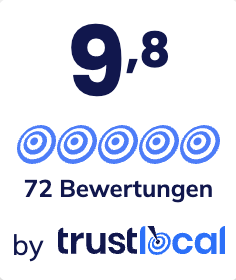SEO – Web design – Google Ads – Social media
Stop being invisible. As your partner, we bring companies in Cologne and across Germany to the #1 spot. With strategy, ads, and web design, we deliver measurable results.
With strategic SEO, we secure top rankings on Google and ensure more qualified customer inquiries.
With targeted advertising campaigns, we reach your target group immediately and generate directly measurable results.
We create modern websites that strengthen your brand and turn visitors directly into customers with good design.
We create a strong brand on social media and turn your followers into long-term
loyal customers.
There are no queues at SEO Marketing – your contact person is always just a phone call away. Together with you, we regularly analyze all relevant KPIs and successes – transparently, comprehensibly and in line with your goals. So you are always one step ahead of the competition.
The future searches with AI – and should find you! We optimize your website so that it not only inspires people, but also convinces algorithms. Visibility that works – for real reach, measurable leads and sustainable online success.
Have your website analyzed free of charge and discover optimization potential immediately. Get a quick SEO check with clear tips for better rankings, more visibility and more customers - free of charge, professionally and without obligation.
Friendly to our partners, uncompromising to the competition. With over 20 years of experience in online marketing, we have developed from an SEO agency into an exclusive and efficient team in the marketing industry.
Our vision is to help companies of all sizes realize their full digital potential and become leading brands in their industry. We want to enable growth, strengthen brands and create sustainable success, because the success of our customers is our most important goal.
We develop creative, data-driven and agile online marketing strategies that deliver measurable results. With strong web design, precise SEO, effective ads and innovative social media marketing, we ensure that your brand becomes visible, reaches your target group and your business grows sustainably.












We listen, understand your goals and lay the foundations for your long-term success.
We develop strategies that work and are precisely tailored to your target group.
We implement your strategy with precision and bring your brand visibly to the fore.
Success is measurable: We analyze, optimize and get the most out of every measure for you.
- free of charge & non-binding
Together we analyze your current online presence
We show you how to achieve more reach with less budget
- for your growth
Trustindex überprüft, ob die Originalquelle der Bewertung Google ist. Die Zusammenarbeit verlief absolut unkompliziert. Besonders die Beratung im Bereich LinkedIn Werbung war für unser Expertenteam ein echter Gewinn. Endlich werden wir auch dort gefunden.Gepostet aufTrustindex überprüft, ob die Originalquelle der Bewertung Google ist. Nach einer umfassenden Analyse wurde unsere Sichtbarkeit durch gezielte Suchmaschinenoptimierung verbessert. Vor allem die lokale Auffindbarkeit hat enorm zugenommen. Wir sehen eine deutliche Zunahme an Anfragen.Gepostet aufTrustindex überprüft, ob die Originalquelle der Bewertung Google ist. Unsere Social-Media-Kampagnen für Umzugsunternehmen erhalten endlich die Reichweite, die wir uns gewünscht haben. Die kreative Ansprache in Posts und Anzeigen kommt bei unseren Kunden super an.Gepostet aufTrustindex überprüft, ob die Originalquelle der Bewertung Google ist. Das Team hat uns beim Relaunch der Homepage intensiv begleitet. Besonders hervorzuheben ist die schnelle Reaktionszeit und die große Erfahrung im Bereich SEO und Webdesign. Sehr zu empfehlen.Gepostet aufTrustindex überprüft, ob die Originalquelle der Bewertung Google ist. Sehr freundlicher Service, alle Fragen wurden ausführlich beantwortet. Die Konzepte waren gut verständlich und individuell auf unseren Pflegedienst zugeschnitten. Wir sind mit dem Ergebnis sehr zufrieden.Gepostet aufTrustindex überprüft, ob die Originalquelle der Bewertung Google ist. Durch die Meta-Werbung konnten wir unsere Sichtbarkeit als Steuerberater enorm ausbauen. Die Anzeigen sind passgenau geschaltet und der Erfolg lässt sich im Alltag spüren. Top Beratung und Umsetzung.Gepostet aufTrustindex überprüft, ob die Originalquelle der Bewertung Google ist. Viele Dank für die tollen Ideen zur Social-Media-Optimierung. Seitdem wir Beratung und Umsetzung vom Experten haben, erreichen wir eine ganz neue Zielgruppe über Facebook und LinkedIn. Klare Empfehlung, wenn es um Online-Marketing geht!Gepostet aufTrustindex überprüft, ob die Originalquelle der Bewertung Google ist. Als Immobilienmakler habe ich lange nach einem Partner für professionelle Suchmaschinenoptimierung gesucht. Schon nach kurzer Zeit waren deutliche Verbesserungen in den Google-Rankings zu sehen. Das Team wusste genau, worauf es in unserer Branche ankommt.Gepostet aufTrustindex überprüft, ob die Originalquelle der Bewertung Google ist. Wir haben unsere Website komplett neu gestalten lassen und sind sehr begeistert vom Ergebnis. Die Zusammenarbeit war freundlich, schnell und kompetent. Unser Webdesign wirkt jetzt viel moderner und wir bekommen positives Feedback von unseren Kunden.Gepostet aufTrustindex überprüft, ob die Originalquelle der Bewertung Google ist. Durch die neuen Marketingmaßnahmen spüren wir endlich eine Steigerung der Anfragen. Die Zusammenarbeit verlief stets zuverlässig, alle Wünsche wurden partnerschaftlich umgesetzt.
The Internet offers endless opportunities for your company. With the right website, you can not only reach more customers, you can communicate directly and without detours with customers, show your expertise through informative content and reviews and build trust. With unlimited possibilities, the right strategy is key. What is the best way for your online store? As a local service provider, what is the best way to reach your customers? How do you successfully assert yourself against the competition and achieve new business success? This is exactly where SEO Marketing GmbH comes in. With individual solutions and well thought-out concepts, we offer you the tools to stand out from the crowd and retain customers in the long term.
Understanding you as a customer and reflecting your corporate image in the best possible way is particularly important to us. Our team takes the time to understand your wishes, ideas and values. This gives you a customized marketing concept that you can identify with. Your personal contact will advise you on your concerns in an easy-to-understand and competent manner so that together we can set measurable goals for your company’s success. This means you are always directly involved in your marketing!
The websites we design are independently checked by CERT-EU. So you can be sure that your website is not only aesthetically pleasing, but also meets all search engine criteria. Your site will be checked for over 100 criteria. With attractive designs, appealing texts and websites specially designed for search engines, no wish remains unfulfilled.
An infinite number of marketing opportunities means an infinite number of paths! With the full service offer from your SEO marketing agency, you are sure to reach your goal. Whether it’s appealing websites, target group-oriented social media campaigns or exciting blog articles: Our team adapts to your individual requirements, advises you professionally and offers you exactly the solutions you need. This is how sustainable marketing works today.
In the digital age, Search Engine Optimization (SEO) is one of the most effective strategies for bringing companies to the attention of potential customers. A targeted SEO strategy not only improves visibility in organic search results, but also ensures long-term success in online marketing.
To use SEO successfully, companies need to understand the various facets and apply them effectively:
On-page SEO includes all measures that are carried out directly on your own website to increase its visibility. This includes keyword research, the creation of high-quality content and internal linking. By integrating relevant keywords appropriately, companies can address their target group in a targeted manner.
Off-page optimization focuses on external factors, such as building backlinks. A high number of high-quality links signals to search engines that the website is trustworthy. Measures such as social media and influencer marketing also contribute to optimization.
Technical SEO ensures that a website functions technically flawlessly. Fast loading times, optimized navigation and correct implementation of schema markups play a central role here. It is equally important to adapt the website for mobile devices, as search engines prefer websites that work smoothly on smartphones.
Local SEO is crucial for local businesses to reach potential customers in their area. A correct entry in Google My Business and local keywords, such as “hairdresser in Munich”, help to be found better regionally.
SEO tools such as Google Analytics, Ahrefs or SEMrush are essential for analyzing data, planning optimization measures and measuring success. With the help of these tools, companies can track specific trends and continuously improve their strategy.
SEO is closely linked to other online marketing measures such as Google Ads or content marketing. While paid ads deliver quick results, SEO ensures sustainable visibility. A strong SEO strategy works synergistically with Google Ads and improves the position in the search results.
A well-thought-out SEO strategy is essential for long-term success in organic search results. It combines technical optimization with relevant content and effective off-page measures. With the right use of SEO tools and a focus on the needs of users, companies can not only expand their reach but also target potential customers.
Do you want more visibility, more leads and sustainable growth? Then we are the right partner for you!
Whether you have questions, would like advice or want to get started right away - we look forward to getting to know you and starting your digital mission together.
Just write to us or give us a call - we are here for you!
Sie sehen gerade einen Platzhalterinhalt von Standard. Um auf den eigentlichen Inhalt zuzugreifen, klicken Sie auf den Button unten. Bitte beachten Sie, dass dabei Daten an Drittanbieter weitergegeben werden.
Weitere Informationen